- Home
- Medical news & Guidelines
- Anesthesiology
- Cardiology and CTVS
- Critical Care
- Dentistry
- Dermatology
- Diabetes and Endocrinology
- ENT
- Gastroenterology
- Medicine
- Nephrology
- Neurology
- Obstretics-Gynaecology
- Oncology
- Ophthalmology
- Orthopaedics
- Pediatrics-Neonatology
- Psychiatry
- Pulmonology
- Radiology
- Surgery
- Urology
- Laboratory Medicine
- Diet
- Nursing
- Paramedical
- Physiotherapy
- Health news
- Fact Check
- Bone Health Fact Check
- Brain Health Fact Check
- Cancer Related Fact Check
- Child Care Fact Check
- Dental and oral health fact check
- Diabetes and metabolic health fact check
- Diet and Nutrition Fact Check
- Eye and ENT Care Fact Check
- Fitness fact check
- Gut health fact check
- Heart health fact check
- Kidney health fact check
- Medical education fact check
- Men's health fact check
- Respiratory fact check
- Skin and hair care fact check
- Vaccine and Immunization fact check
- Women's health fact check
- AYUSH
- State News
- Andaman and Nicobar Islands
- Andhra Pradesh
- Arunachal Pradesh
- Assam
- Bihar
- Chandigarh
- Chattisgarh
- Dadra and Nagar Haveli
- Daman and Diu
- Delhi
- Goa
- Gujarat
- Haryana
- Himachal Pradesh
- Jammu & Kashmir
- Jharkhand
- Karnataka
- Kerala
- Ladakh
- Lakshadweep
- Madhya Pradesh
- Maharashtra
- Manipur
- Meghalaya
- Mizoram
- Nagaland
- Odisha
- Puducherry
- Punjab
- Rajasthan
- Sikkim
- Tamil Nadu
- Telangana
- Tripura
- Uttar Pradesh
- Uttrakhand
- West Bengal
- Medical Education
- Industry
Buspirone benefits severe bloating but not postprandial fullness in gastroparesis

A Randomized Controlled Trial published in Alimentary Pharmacology & Therapeutics by Dr Henry P Parkman has concluded that Treating with the 5-HT1 receptor agonist buspirone in patients with gastroparesis falls short of reducing symptoms, including moderate-to-severe early satiety/postprandial fullness.
It is already known that gastroparesis patients and those with related disorders have early satiety, postprandial fullness and bloating. To improve fundic accommodation, Buspirone, a 5-HT1 receptor agonist, may be used.
Considering this background, in the present study, researchers determined whether Buspirone improves early satiety and postprandial fullness in gastroparesis patients.
The study included patients presenting with symptoms of gastroparesis and moderate-to-severe symptoms of fullness. 10 mg of Buspirone was given orally, while the placebo thrice daily. The primary outcome was a change in the ES/PPF from baseline to 4 weeks.
The key results of this study are:
- There were a total of 96 patients, with 92 % female.
- Forty-seven were randomised to Buspirone were 49 to placebo.
- 50% had delayed gastric emptying, and 39% were diabetic.
- There was no between-groups difference in the 4-week ES/PPF primary outcome.
- Buspirone performed better compared to placebo in patients with a history of severe-to-very severe bloating at baseline compared to patients with none to moderate.
- For those with GCSI symptoms, only bloating improved with Buspirone vs placebo.
Concluding further, they said those with a history of moderate-to-severe early satiety/postprandial fullness and other symptoms of gastroparesis did not benefit from buspirone treatment to improve the ES/PPF primary outcome compared with placebo.
They also added that Buspirone has benefits in patients with more severe bloating.
Further reading:
Parkman HP, Yates KP, Sarosiek I, Bulat RS, Abell TL, Koch KL, Kuo B, Grover M, Farrugia G, Silver P, Abdullah A, Maurer AH, Malik Z, Miriel LA, Tonascia J, Hamilton F, Pasricha PJ, McCallum RW; NIDDK Gastroparesis Clinical Research Consortium. Buspirone for early satiety and symptoms of gastroparesis: A multi-centre, randomised, placebo-controlled, double-masked trial (BESST). Aliment Pharmacol Ther. 2023 Jun;57(11):1272-1289. doi: 10.1111/apt.17479.
BDS, MDS in Periodontics and Implantology
Dr. Aditi Yadav is a BDS, MDS in Periodontics and Implantology. She has a clinical experience of 5 years as a laser dental surgeon. She also has a Diploma in clinical research and pharmacovigilance and is a Certified data scientist. She is currently working as a content developer in e-health services. Dr. Yadav has a keen interest in Medical Journalism and is actively involved in Medical Research writing.
Dr Kamal Kant Kohli-MBBS, DTCD- a chest specialist with more than 30 years of practice and a flair for writing clinical articles, Dr Kamal Kant Kohli joined Medical Dialogues as a Chief Editor of Medical News. Besides writing articles, as an editor, he proofreads and verifies all the medical content published on Medical Dialogues including those coming from journals, studies,medical conferences,guidelines etc. Email: drkohli@medicaldialogues.in. Contact no. 011-43720751


